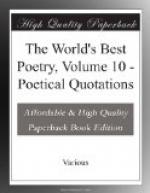Title: The World’s Best Poetry — Volume 10
Author: Various
Edited
by Bliss Carman
Release Date: July 17, 2004 [EBook #12925]
Language: English
Character set encoding: ASCII
*** Start of this project gutenberg EBOOK the world’s best poetry—volume 10 ***
Produced by Charles Aldarondo, Leonard Johnson, and
the Online
Distributed Proofreading Team.
THE WORLD’S BEST POETRY
[Illustration]
I Home: Friendship
ii Love
iii Sorrow and Consolation
iv The Higher Life
V Nature
VI Fancy: Sentiment
VII Descriptive: Narrative
VIII National Spirit
IX Tragedy: Humor
X Poetical Quotations
THE WORLD’S BEST POETRY
IN TEN VOLUMES, ILLUSTRATED
Editor-in-Chief
bliss Carman
Associate Editors
John Vance Cheney
Charles G.D. Roberts
Charles F. Richardson
Francis H. Stoddard
Managing Editor
John R. Howard
1904
The World’s Best Poetry Vol. X
POETICAL QUOTATIONS
AFTER ALL, WHAT IS POETRY
By
John R. Howard
* * * * *
AFTER ALL, WHAT IS POETRY?
By John Raymond Howard.
Considering the immense volume of poetical writing produced, and lost or accumulated, by all nations through the ages, it is of curious interest that no generally accepted definition of the word “Poetry” has ever been made. Of course, all versifiers aim at “poetry”; yet, what is poetry?
Many definitions have been attempted. Some of these would exclude work by poets whom the world agrees to call great; others would shut out elements that are undeniably poetic; still others, while not excluding, do not positively include much that must be recognized as within the poetical realm. In brief, all are more or less partial.
Perhaps a few examples may make this clearer, and show, too, the difficulty of the problem.
“Poetry,” says Shelley, “is the record of the best and happiest moments of the happiest and best minds.” But how can this include that genuine poetic genius, Byron, who gloried in being neither good nor happy? Lord Jeffrey, one of the keenest of critics, says that the term may properly be applied to “every metrical composition from which we derive pleasure without any laborious exercise of the understanding.” In this category, what becomes of Browning, whom Sharp characterizes




